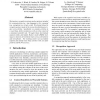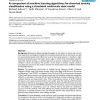441 search results - page 64 / 89 » Linear Discriminant Analysis for Signatures |
IJCNN
2008
IEEE
15 years 7 months ago
2008
IEEE
Abstract— This paper proposes an approach to learn subjectindependent P300 models for EEG-based brain-computer interfaces. The P300 models are first learned using a pool of exis...
101
Voted
ICPR
2006
IEEE
15 years 6 months ago
2006
IEEE
One successful approach to feature extraction in face recognition problems is that of linear discriminant analysis (LDA). We examine an extension of this technique, called angular...
127
click to vote
PERVASIVE
2004
Springer
15 years 6 months ago
2004
Springer
Most gesture recognition systems analyze gestures intended for communication (e.g. sign language) or for command (e.g. navigation in a virtual world). We attempt instead to recogn...
93
Voted
BMCBI
2008
15 years 24 days ago
2008
Background: Bioactivity profiling using high-throughput in vitro assays can reduce the cost and time required for toxicological screening of environmental chemicals and can also r...
82
Voted
ICASSP
2010
IEEE
14 years 10 months ago
2010
IEEE
A major limitation of Brain-Computer Interfaces (BCI) is their long calibration time, as much data from the user must be collected in order to tune the BCI for this target user. I...


